The global luxury travel market is huge, not in the number of guests with substantial buying power but the astonishing level of buying power that these luxury travellers have. The good news for hoteliers targeting those top 5% of guests is that they seem to spending more every year. The global Luxury tourism market had an estimated total revenue of USD 1,308.15 billion in 2022, and is projected to be worth USD 3,023.78 billion by 2032.
In this article
- Step 1: Know who you are talking to
- Millennials & Aspiring Luxury
- Baby Boomers and Absolute Luxury
- Step 2: Keep Up to Date with Luxury Travel Trends
- Barefoot Luxury
- Multigenerational Travel & Grand Gatherings
- Sustainability
- Wellness tourism
- Bleisure/Bluxury
- Staycations
- Step 3: Adjust your offerings
- Offer unique experiences
- Offer authenticity and immersive guest experiences
- Offer Instagrammable moments
- Offer Hyperpersonalisation
Aside from these travellers being prepared to spend up to $3000 per night, with the average landing at a comfortable $500 per night according to a Bloomberg MLIV Pulse Survey, they are also taking more than double the number of trips that your regular traveller may take. A study by Resonance found that “the top five per cent take 14.3 trips per year (half for business and half for leisure, totalling an average of 29 days per year). U.S. travellers overall take an average of 4.8 trips.”
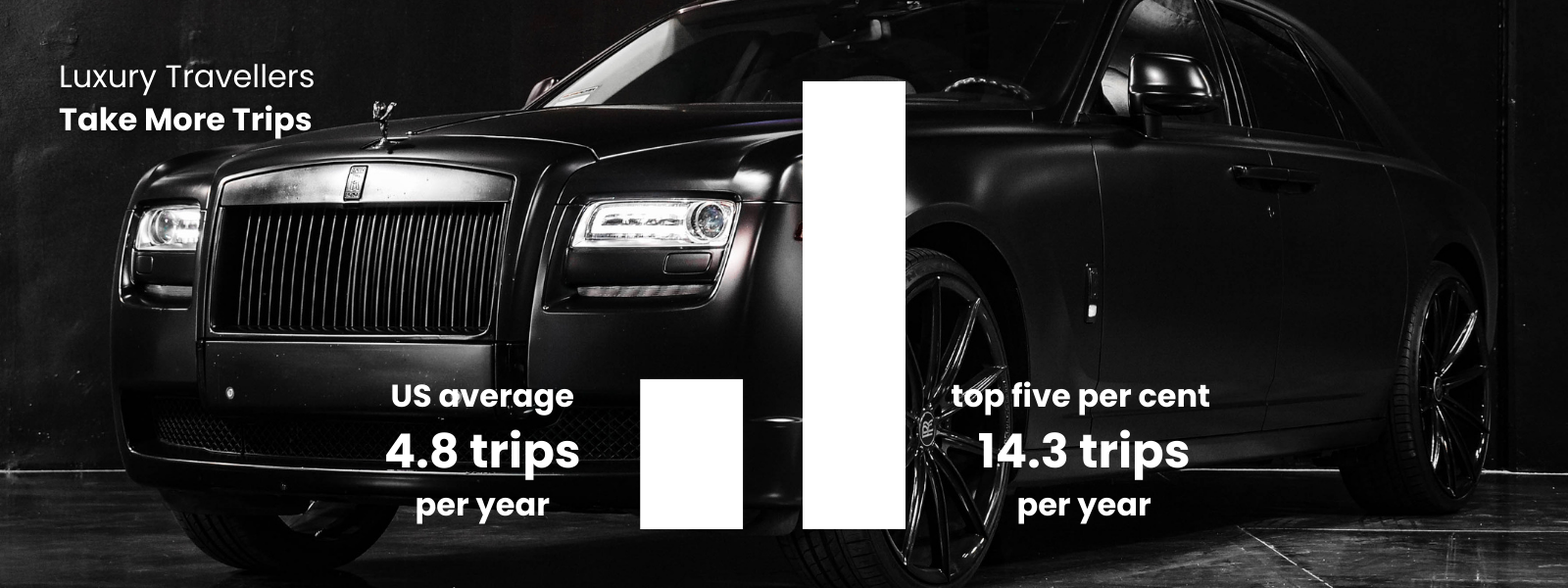
One of the biggest benefits of appealing to the luxury market is that while the rest of the world may be affected financially by global events (e.g. covid-19, the Russia-Ukraine War and the cost of living crisis) these most affluent travellers have the wealth to continue to spend despite global economic turmoil.
How do you attract this small but lucrative target segment to your property?
Step 1: Know who you are talking to
The luxury travel industry is fairly complex, with different demographic groups looking for different experiences from their luxury holiday. While they all have significant buying power, marketing to the different guest segments would look quite different.
By age group, the market is segregated into Millennials, Generation X, Baby Boomers, and the Silent Generation. Depending on the degree of wealth these types of luxury travellers will spend on travel, products are further segmented into absolute luxury, aspiring luxury and accessible luxury. The absolute luxury segment spends the most and most frequently. However, targeting aspiring and accessible luxury travellers could lead to a significant boost in your bottom line, as they are still frequent travellers who are looking for exceptional experiences in their next destination.
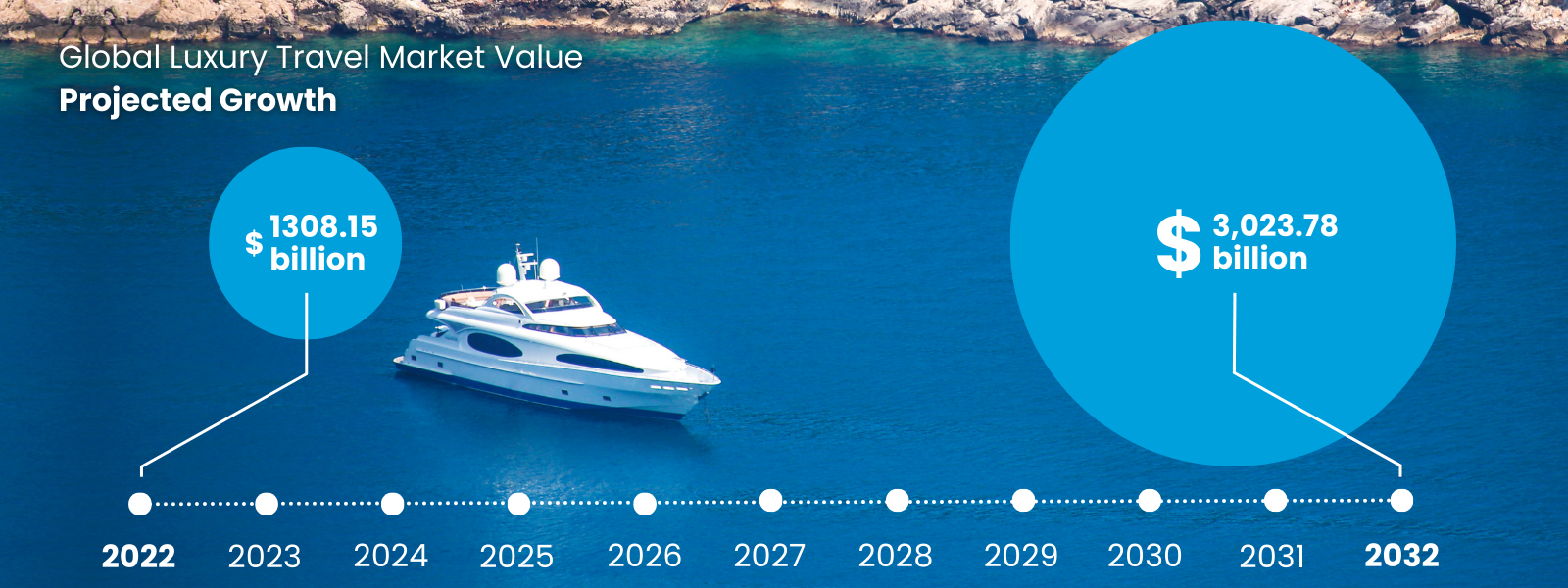
Millennials & Aspiring Luxury
One significant luxury demographic group are the Millennials, these are travellers between the ages of 28-43 who were born into the age of technology and use it to their advantage. They generally seem to be more active than the Baby Boomers and also seek unique experiences and culturally immersive trips over predictable luxury hotel stays.
These travellers tend to seek authenticity and want to become involved in the day-to-day living of the location they are visiting. They are also looking for the most ‘Instagrammable’ location for their vacation, to be able to share it with friends and family on their social media platforms. While Millennials encompass a large part of the luxury travel market, according to a report by Allied Market Research, Millennials “spend $527 a day on a trip which is 62% less than their older counterparts.”
In line with the findings from the Allied Market Research report, many of the Millennial travellers are often classified as ‘aspiring luxury’ and ‘newly rich’ travellers. These moderately wealthy individuals value travel and are willing to part with significant amounts of their disposable income for travel. On average, they take five business and leisure trips annually, which are generally shorter luxury breaks, in comparison to their older counterparts, due to financial constraints.
Baby Boomers and Absolute Luxury
While there is still significant wealth attributed to the aspiring and accessible luxury travel market there is not much that can compare to the affluence of a small percentage of high-net-worth individuals (HNWIs). However, if you are catering to these guests you will know that they demand opulence, exclusivity, careful curation and innovation. They expect private yachts to remote locations, gastronomic journeys through foreign countries and a private butler to see to their every need.
Considering that 20% of over 65s in the UK are HNWIs, and that Baby Boomers control about half of the wealth in the United States (while only accounting for 20% of the population), it’s not surprising that Baby Boomers had the highest share of the Luxury travel market in 2022 at about 41.57%.
These guests are often retired or soon to retire and have the disposable income and time to take extended luxury vacations, and they are generally seasoned travellers and know exactly what they expect from their next holiday. These travellers also have the means to employ someone else to do their research and running around, and they do. When it comes to booking, they often seek the advice of travel agents rather than going it alone online – 85% of luxury travellers told hlehl that the best way to book personalised luxury travel was through a travel advisor.
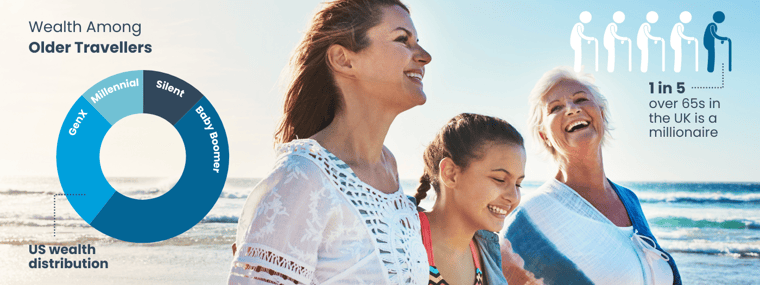
Step 2: Keep Up to Date with Luxury Travel Trends
No matter which luxury segment you are marketing to, there are some clear trends across the luxury travel market. One of which is the significant change in consumer behaviour from seeking material possessions to spending disposable income on unique experiences.
“In 2022, luxury travel took on a new perspective, prioritizing experiences over material possessions. Travellers sought personalized and customized journeys, while also embracing sustainability and responsible travel practices.”
– Global Data
Many of these travel trends are not exclusive to luxury travellers, but when done on a luxury budget many of these trends translate into something a lot more enticing and lucrative for property owners.
Barefoot Luxury
Barefoot luxury can be defined as experiencing comfort, sophistication and luxury in a laid-back environment. Traditional luxury often requires some input from the guest – they have to look, dress and act the part of the luxury tourist. Barefoot luxury gives the guest space to truly relax and quite literally let her hair down, while still being treated like a VIP.
It’s all about embracing comfort and encouraging guests to experience your surroundings while at the same time providing an excellent, exclusive and luxurious experience. Over the years, barefoot luxury has come to be associated with nature and local experiences together with comfort, making it a possibility regardless of where you find yourself. Barefoot luxury requires careful planning to ensure the right balance between authenticity and comfort.
Andrea Britt, the co-founder at Secret Getaway summarised it perfectly in an article for IOL “Barefoot luxury isn’t about being cheap, it is about the immersive experience that guests get to enjoy. These experiences are well out and different to what many have experienced before,” she explained.
Safari and adventure travel – the stereotypical barefoot luxury holiday – was the single largest luxury travel segment in 2022, accounting for 34.2% of market share and a revenue of USD 461.65 billion. Other variations on the barefoot luxury theme, such as wellness retreats, are also increasing in popularity.
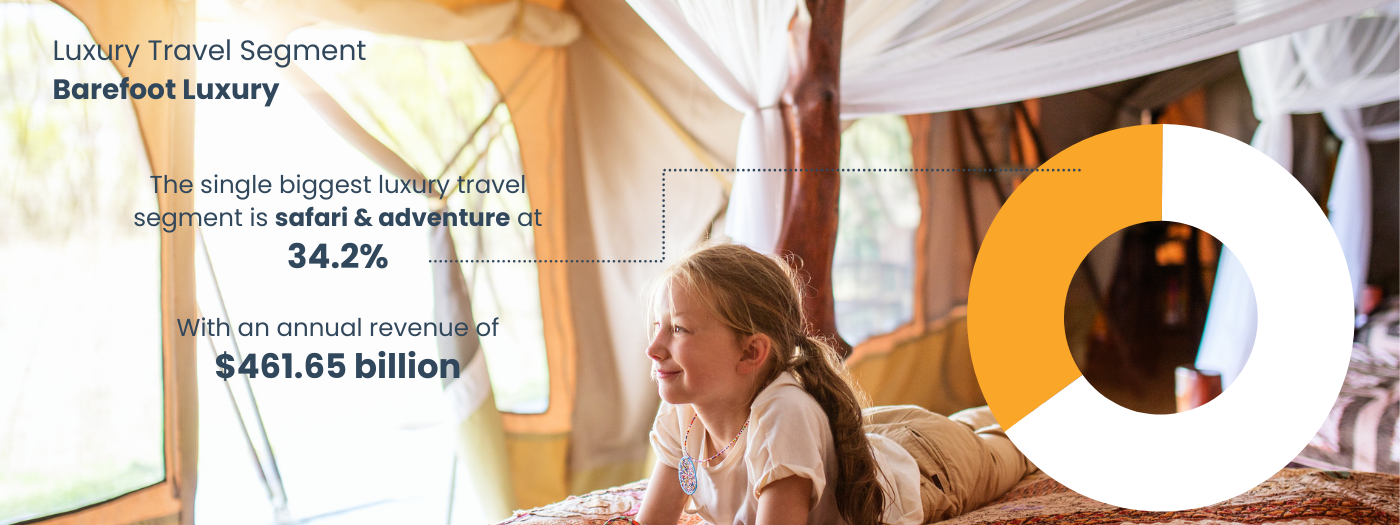
Multigenerational Travel & Grand Gatherings
Another two travel trends which have leaked into the luxury travel market include the increase in multigenerational family holidays and the newer concept of Grand Gatherings. Grand Gatherings refer to a large group of travellers who travel together for a special event or function. These groups may be somewhat related, for example, several family units travelling together to create a gathering.
delAround 40% of the top five per cent of earners planned to take a multigenerational trip in the next year, according to an Altiant survey, and Jack Ezon, founder of Embark Beyond, a luxury travel group focussing on Ultra-HNWIs, told Forbes: “Multigenerational travel is still the biggest growth area for us, and has been consistently growing for years. In 2019 multigen experiences grew by 22% and now account for 32% of our transactions and 43% of our overall revenue”.
“In line with the continuous growth of multi-generational and group gathering demand, villa vacations continue to grow with the greatest growth in what we call the “mega-villa” segment. Families still account for the lion's share of villa sales with about 60% of villa requests. However, a huge emerging market segment accounts for almost 30% of villa demand, and that is small gatherings of non-family constituents. This is one of the most important market phenomena that has emerged from Covid.”
– Embark Travel Trends 2023 report
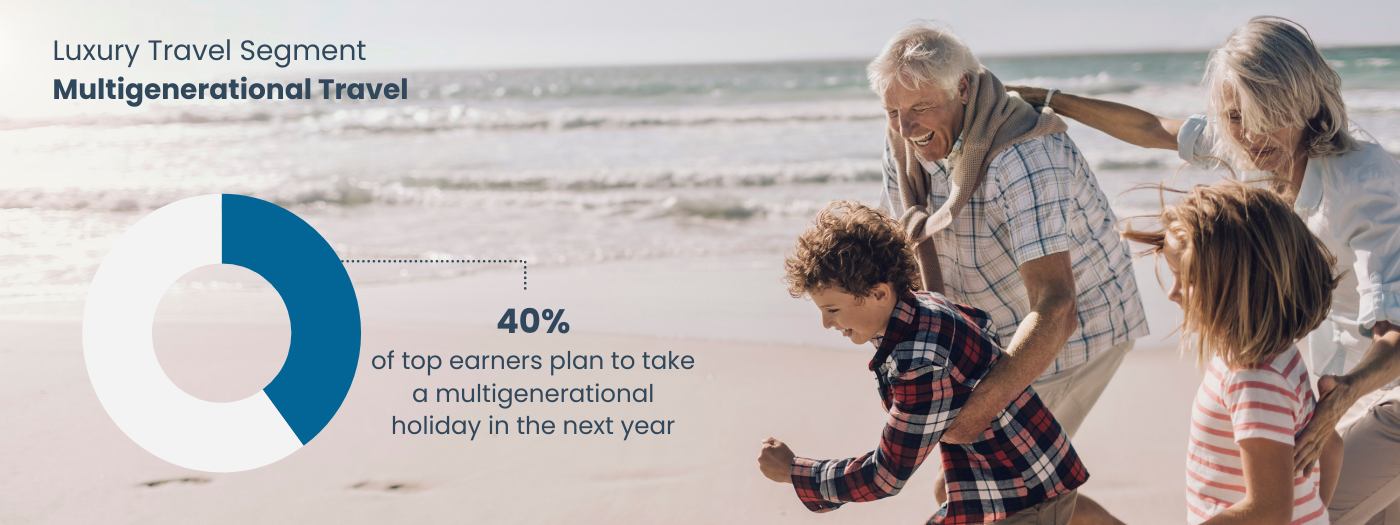
Sustainability
Sustainability is a hot topic in all industries, from the revolt against using single-use plastics to increasing scrutiny of the carbon output of delivery and manufacturing processes. Unsurprisingly, consumers are also looking for sustainable ways to travel.
Aside from doing your bit for the earth, you will be a more attractive option for many travellers if you have green credentials to flaunt - over 80% of respondents in a Statista survey said that sustainable travel was important to them.
“A business with a focus on sustainability is a business which actively seeks out 'engagement with people, community and planet'.”
— EHL
This may be especially true among those who don’t mind spending a little bit more to ease their conscience. Many affluent travellers want to know that their luxurious and extravagant trips are not coming at the expense of the environment and therefore many luxury travellers are searching for eco-conscious travelling. When luxury travel advisory group Virtuoso surveyed their clients, 74% of them said they were “willing to pay more to travel sustainably if they know where their money’s going.”
Post-pandemic sustainable travel has also come to include not only the preservation of the environment but the preservation of cultural heritage and local communities as well. This feeds back into the loop of luxury travellers looking to immersive themselves in a location, and experience all that it has to offer. The upside is that incorporating local cuisine, culturally immersive excursions and embracing the local environment means that much of the influx of wealth via travellers is dispersed into the local community.
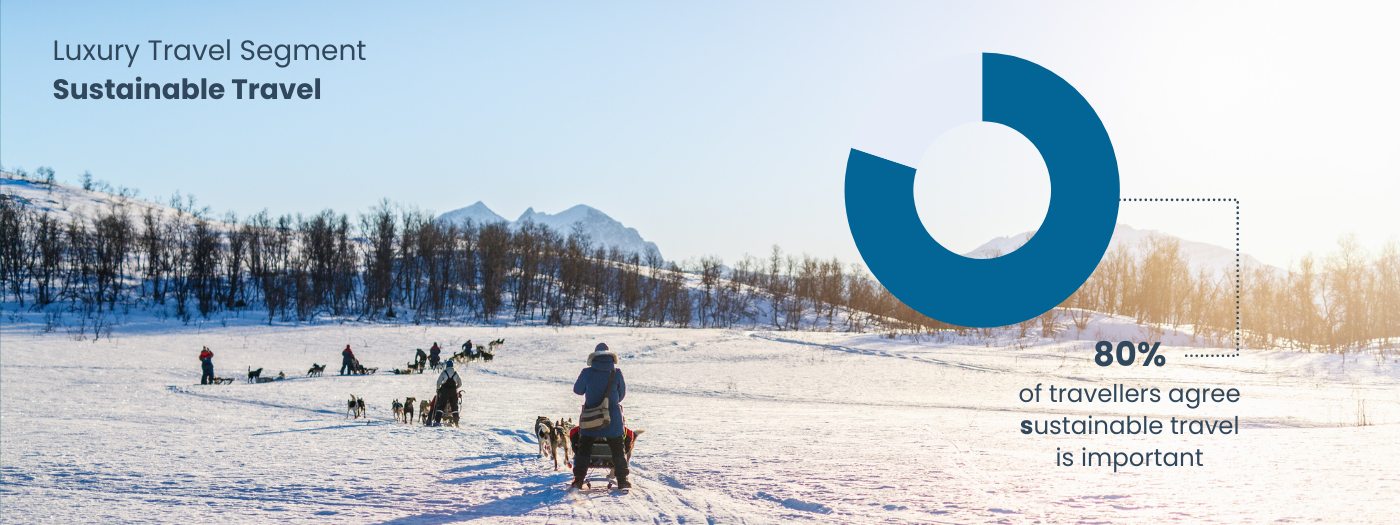
Sustainability should therefore not simply be seen in terms of once-off changes that can be made or a problem that can be fixed. It requires a long-term commitment to being sustainable. And when sustainability is committed to, it becomes not just a feature that you can advertise to your environmentally conscious clientele, but an investment in your, and your community’s, future.
Get started going green with insights from the WTTC [interview]
Wellness tourism
Wellness is one of the fastest-growing sectors in the hospitality industry, accounting for 476.1 billion in 2022, and predicted to be worth 1.02 trillion by 2030.
Travellers across the wealth spectrum appear to agree that travel can be beneficial for mental and physical wellness, and that this is something worth spending time and money on. When they were surveyed in 2022, 44% of Booking.com’s users were planning a meditation or mindfulness holiday in the coming year, and 42% wanted a break with a focus on physical or mental health.
In 2021, 88% of survey respondents told American Express they believed travel was good for mental health, and 76% said they wanted to spend more on travel that would improve thier wellbeing, and 55% said they would pay more for additional wellness activities. In an Altiant survey, 61% of the top five per cent of earners said that wellness played a major role in their travel plans.
Interestingly enough wellness tourism is experiencing many cross-overs with other key luxury niches such as sustainable travel and barefoot luxury as many travellers are foregoing the commercial spas and cookie-cutter retreat centres and rather looking at doing nature immersive experiences and reconnecting with Mother Earth.
“Luxury retreats that offer mountain hikes, forest bathing, and wild swimming even in cold waters adopting the Wim Hof cold therapy method, will be on the list of high-end travellers looking for a dive into the wild in 2024.”
– Me Time Away Magazine
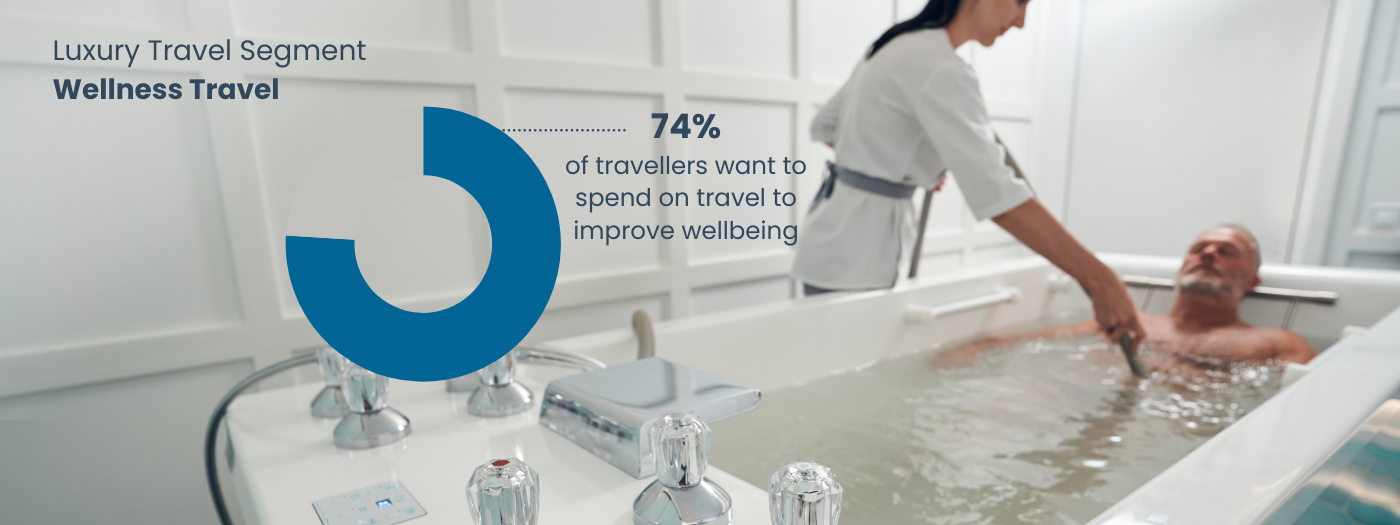
Bleisure/Bluxury
Bleisure travellers are those people who mix or combine travelling for business and pleasure – some do both at the same time and some go to places for business and then stay for a few days afterwards for a luxury vacation. Bluxury is a similar concept but with the addition of these business and leisure guests seeking absolute luxury.
Blesiure travel has been on the increase post-covid. With many employees working remotely or living ‘nomadically’, there is no reason to rush home after a work trip, as long as there is sufficient Wifi and other business-related amenities, remote workers are free to stay on and experience the local culture. In addition to this many employers are using travel to bring together teams who work remotely, trying to encourage team morale and communication.
“Growth in commercial flight bookings exceeded leisure travel for a portion of 2022 and is now recovering in tandem with leisure travel in 2023, up 42% year-over-year-to-date change from 2022 to 2023.”
– Mastercard Economics Institute
Staycations
A trend that was borne out of necessity during the travel restrictions of 2020, the ‘staycation’ has evolved into an affordable and convenient way for travellers to get their taste of luxury. Whether they are on a tighter budget than the traditional luxury traveller or if they don’t have available time to take a long trip to new destinations you can offer them the same solutions to their problems of needing a rest, feeling pampered and feeling like they are experiencing exclusive luxury and they can do that around the corner from their home.
As we have mentioned before, the luxury traveller is looking for an experience, not just a lavish hotel room. With that in mind hoteliers looking to capitalise on the ‘staycation’ phenomenon need to think outside the box and create the same exclusive experiences that the luxury traveller is seeking but from a different perspective. Place focus on those elements that symbolise ‘luxury vacation’ in the mind's eye of your guest. When creating your staycation package, look to include a bottle of champagne, an upgrade to a suite, or maybe a cooking class.
The idea of a staycation is to get away from day-to-day life. You need to sell your guests on the fact that they can achieve this without travelling to a faraway place. To do this, you’ll need to create that sense of escape within the grounds of your own hotel. Consider creating a weekly or monthly event schedule focused on movies, music, wellness, and meditation.
Step 3: Adjust your offerings
Offer unique experiences
According to MasterCard’s report on Travel Industry Trends, spending on things increased a measly 12% from 2019 to 2023, while travellers spent 65% more on experiences in the same period.
Luxury travellers are looking to spend their money, and lots of it, on unique, once-in-a-lifetime and culturally immersive experiences. It's no longer about fancy hotel rooms and top-of-the-line amenities, these travellers are looking for something unique.
“Luxury travellers are looking for experiences that are authentic, unique, and personal. They’re not interested in cookie-cutter vacations or one-size-fits-all solutions. They want something that is tailored specifically for them.”
– Katie Dillon, Editor, La Jolla Mom
This trend is not confined to the luxury travel market, in fact, according to a Booking.com study, “73% of respondents are looking forward to experiencing ‘out of comfort zone’ travel that pushes them to the limit.”
We can see this in action as some of the larger brands are already taking huge strides in including experiences and not just hotel rooms into their offerings, for example, Marriott launched their first fleet of The Ritz Carlton yachts during the last quarter of 2022, offering a novel way to experience hidden gems and amazing places.
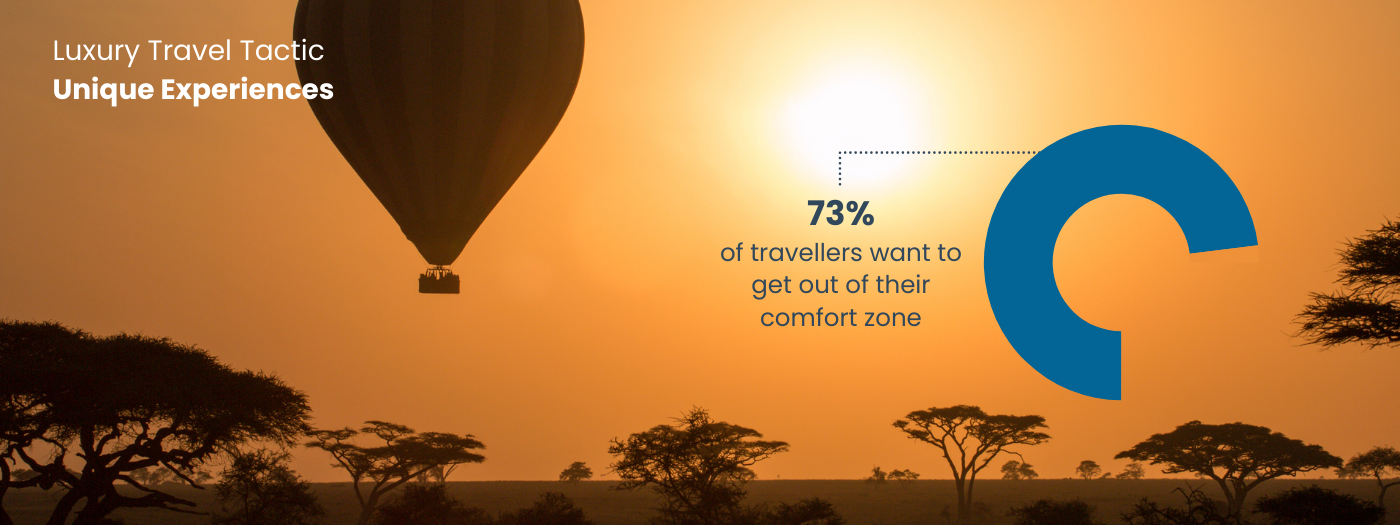
In practice:
Crafting tailored packages that centre around activities and experiences can be a compelling draw card for these discerning luxury travellers seeking unique adventures.
Even if your property doesn't host these activities directly, establishing partnerships with local providers can yield mutually beneficial arrangements. Furthermore, ensuring that your website features a curated list of nearby activities and experiences, along with showcasing them creatively in guest rooms, can elevate the overall guest experience.
Equipping your staff with thorough knowledge of the local area and its offerings will also contribute to making guests feel well-cared-for and their needs catered to.
Find out more about the “Barefoot Luxury” travel niche
Offer authenticity and immersive guest experiences
With millennial travellers prioritising discovery and adventure, it's evident that they crave immersive experiences and authentic cultural encounters. Rather than opting for traditional luxury resorts, Millennials are drawn to unconventional experiences such as staying at a Berber camp in Morocco, dog sledging in Norway, or embarking on a helicopter ride over Victoria Falls.
“Experiential, or immersive, tourism typically attracts travellers seeking in-depth physical enrichment, emotional fulfilment, spiritual awareness, intellectual nourishment, or a combination of these.”
– Future of Luxury Travel
In practice:
Hoteliers can also strive to create an experience for potential guests online, using creative content and images to tell a story that allows potential guests to immerse themselves in the experience while they are still in the early stages of planning their travel.
Creating immersive experiences doesn't necessarily have to see the guest even leave the hotel. You can think of creative and culturally relevant fine dining experiences and sampling locally made spirits or wines. In addition, you can include novel and locally sourced amenities, such as artisanal soaps and naturally occurring flowers in the rooms.
Offer Instagrammable moments
With the rise in social media popularity and online travel influencers, the industry has seen a rise in guests looking for photographic moments to share online. This coupled with the idea of aspirational living means that many travellers are looking to go to places they've seen the rich and famous travel to, or just to one-up their social media friend circle.
According to a report written by The Olinger Group based on a survey of over 1500+ ‘luxury travellers’, 77% of them admitted to selecting “vacation destination based primarily on social media.”
They are also hugely impacted by online traveller reviews with 85% of the participants agreeing that they have read online reviews from review sites before booking their luxury trip.
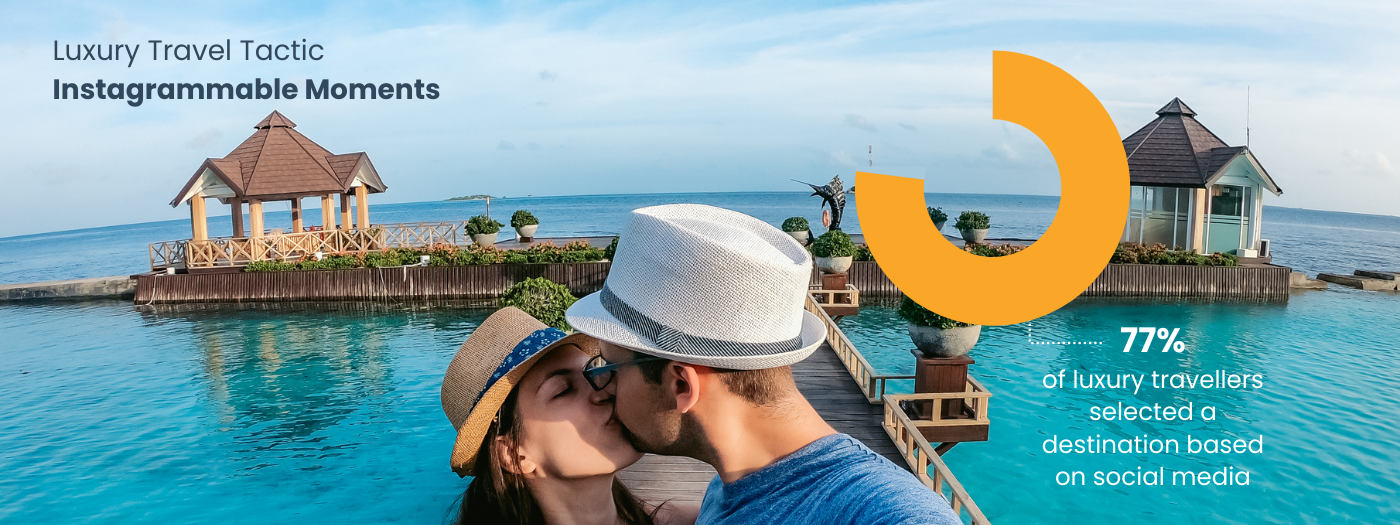
In practice:
Making sure your hotel is ‘Instagrammable’ at all times can be a tall ask, but you can start to look at consolidated review data and learn what your guests love most about your property and work to highlight those areas even more.
“With social media an increasingly important channel for communicating guest preferences and recommendations, hoteliers would do well to focus on features that their guests are speaking most about – enhancing these features, without sacrificing other parts of the guest experience which lead to overall guest satisfaction and loyalty.”
– Jonathan Barouch, Local Measure Founder and CEO
You can think about creating set ‘photographic locations’ for your guests, this way you start to control the narrative as to which areas of your hotel are photographed frequently. For the guest, it also takes out the mental effort to decide where to take their photos, and can instead just concentrate on enjoying themselves.
Curating these photo-worthy scenes also creates a trend, and potential guests who have seen friends and family or even influencers photographed in a particular location will book their trips around capturing those trending shots. Giving guests novel or creative welcome packages, creative cuisine or unique room decor are just a few examples of how you can help inspire guests to snap pictures in your hotel.
You can use your hotel's social media to market your hotel to potential guests, bringing in the idea of FOMO (Fear Of Missing Out) marketing. Think of Instagram as an image magazine that people browse through frequently – tell them stories to captivate their interest. Share stories about your staff, guests, and locals, and let your guests feel connected to and invested in your property and your location before they have even booked with you.
Here are some practical tips for getting your hotel Instagram-worthy
Offer Hyperpersonalisation
The luxury traveller expects individual attention privacy and exclusivity. Now more than ever luxury travellers want to feel that they are the only ones around. Think private yachts, private islands, custom tours and private excursions. Often this starts with travel advisors who are there to make guests’ trips completely tailored and one-of-a-kind.
“One of the simplest definitions of luxury goes like this: ‘Of course I can do it myself. I don’t want to.’ Travelers want to find somebody that really knows what they’re doing, has great connections, saves time, and has their back.”
– Matthew Upchurch, chairman, Virtuoso
Having this ultra-personalisation even before you have embarked on your trip can set the stage for the holiday. Once the luxury traveller has decided on where to go it is important that the accommodation, excursions and added extras all exude the same level of exclusivity.
Starwood Hotels, for example, assigns personal assistants to guests who stay with them for 100 nights a year or more, and guests at The Portrait Roma hotel in Rome are invited to make use of their “lifestyle team”, who are on hand to personalise each guest’s stay and help them to explore Rome. Don’t think you need to offer a personal assistant to achieve a personalised experience, however; proving personalisation is becoming easier and easier with the right technology.
In practice:
Personalisation can and should start long before a guest arrives at your hotel, and it can begin before a traveller has even decided to book with you with targeted advertising and dynamic website content, websites that adapt to the client's language and show them content based on their location or even search history.
Once you have received a booking, you should send guests a pre-stay questionnaire to ask them the questions you need to make their stays memorable. Not only can you ask them the basics (do they have any food allergies or physical special needs), but you can also ask whether they would prefer a mountain or a pool view, which floor they would like to stay on, and which brand of tea you should leave in their rooms.
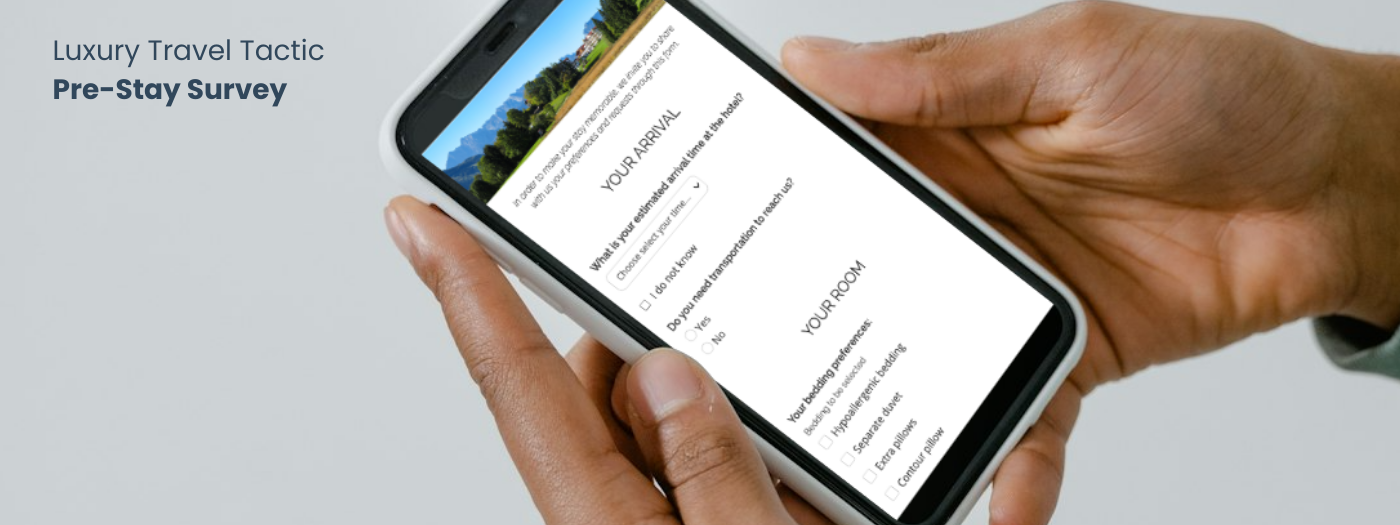
Getting to know key details about your guests before they arrive gives you the opportunity to make them feel even more valued when they check in and discover everything they need is already prepared. Again this can be further enhanced by offering clients the ability to customise their in-room experience through mobile-controlled in-room technology via the use of hotel apps and in-room tablets, think of the guest being able to remotely adjust the temperature of their room before they have even stepped foot inside.
Read about five pre-stay communication techniques to help improve your guest experience
A post-stay questionnaire should be a staple in any establishment, but this questionnaire needn’t just be used to improve your offerings and guest experience – information collected in your post-stay questionnaire can be added to a guest's profile so that, as he or she stays with you more frequently, you can get a fuller picture of their likes and dislikes and make their holidays more specialised and memorable, and you can make your marketing correspondence with them more relevant to their interests.
Whether targeting Baby Boomers, Millennials or any other luxury travel demographic, the key lies in offering unique, authentic, and hyper-personalised experiences that resonate with the luxury traveller's desire for exploration, authenticity, and exclusivity. Look at what your property or location has that is unique and tell your story to those potential high-end travellers, let them know what they can do, the images they can capture and how a trip to your hotel can enrich their lives.




